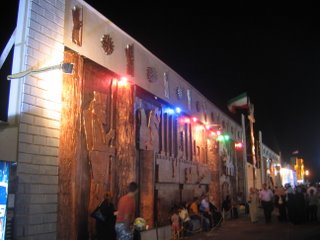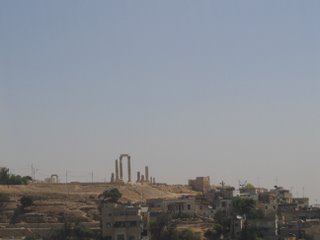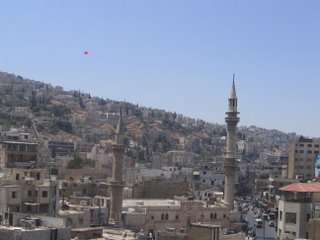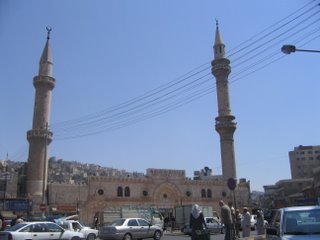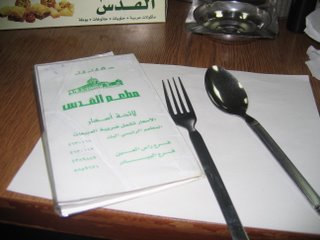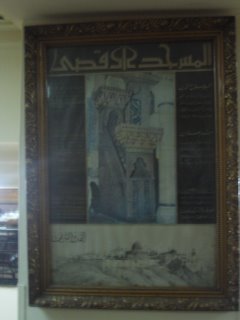Yesterday I attended a great panel discussion at the National Press Club entitled “The Israel Lobby and the U.S. Response to the War in Lebanon.” The event was sponsored by the Council on American-Islamic Relations (CAIR) and the speakers were the authors of the recent paper entitled “The Israel Lobby”, Professors John Mearsheimer and Stephen Walt. Their paper, published by the London Review of Books, created a buzz in academic and political circles mostly in the US but also in the UK and abroad. Naturally, the paper and its authors were attacked by none other than “the lobby” and its die-hard supporters. The professors came today to shed some more light on their research and connect their arguments about the lobby to the American response to the recent war in Lebanon. Although I have read most of the paper, and blogged about it previously, I found the discussion to be enlightening and very timely. This post is not intended to be a transcript of the event, but a brief summary of what I found to be the most important and interesting aspects of the discussion.
Harvard professor Stephen Walt began the discussion by summarizing the highlights of their paper. The main premise of their research is that the strong influence of the Israel lobby has led to policies that are not in the interest of the United States. He pointed out the billions of US tax payer dollars that are provided unconditionally to Israel as military and economic aid, as well as the unwavering diplomatic support that it receives from the executive and legislative branches of the US government. Examples of this include 33 American vetoes (since 1982) of UN SC resolutions that were critical of Israeli actions and policies as well as the favoring of Israel in all of the wars that it has been involved in against its Arab neighbors. Walt explained that the support Israel receives from the US has been justified by strategic and moral reasoning. While Israel may have been a strategic ally during the Cold War and therefore its support justified, the Soviet Union no longer exists so this rationale is null and void.
Today, Israel is said to be an ally in the War on Terror as it shares a “common threat” of terrorism with the US. But as Walt points out, it is the US’s close relationship with Israel and its unconditional support that is one of the reasons America has been the target of terrorism. Upon hearing this claim, neo-conservatives are quick to criticize such statements accusing individuals and policy makers of “succumbing” to the terrorists’ demands. This is a faulty argument in my view, as it is not only the terrorists who are angered by the unwavering support for Israel, but most of the Arab and Muslim world. This, Walt added, has been confirmed by the 9/11 Commission Report, Arab public opinion surveys, as well as internal Pentagon reports that point to America’s relationship with Israel as one of the top grievances. It is clear that while many Arab countries have good relations with the US, the main “bone of contention” is the Israel issue. In addition, Israel’s nuclear arsenal, not challenged by the US, is also another issue of concern especially at a time when the US is attempting to stop other countries in the region from obtaining such weapons. Israel, therefore, is not a strategic asset to help deal with these problems; rather it is the cause of them.
Claims that Israel is a vulnerable country and the “only” democracy in the Middle East are used as moral justifications for the unrelenting US support for Israel. Walt points out that even these so-called moral reasons do not justify the extent of American support. While the US enjoys a liberal style democracy, Israel was established as a Jewish state, which paves the way for de facto discrimination against non-Jewish citizens of the state. In fact, the treatment of Palestinians in the Occupied Territories as well as the treatment of non-Jewish Israelis as 2nd class citizens cannot be morally justified.
In sum, this unprecedented and unreasonable support can only be explained by one reason: the Israel lobby. Walt was quick to point out that the lobby is a loose coalition of individuals and organization, not all of whom are Jewish, and is not a “secret cabal” of some sort. He points out that their activities are not illegitimate or illegal, but are part and parcel of the American system of interest groups that have long worked to influence American politicians. The success of the lobby is in part due to its singular focus on support and advocacy for Israel in addition to being one of the best funded (AIPAC’s annual budget nears $55 Million). The lobby reaches out to legislators and policy makers, helps draft important legislation, works overtime to shape public discourse with the help of the mainstream media that is strongly pro-Israel. The lobby is quick to attack and smear anyone critical of Israel or US support for Israel. It puts pressure on universities, helps fund media outlets, and is helped by Christian Zionist organizations as well as a majority of American think-tanks that usually lean in favor of the Jewish state. In March 2005 a National Journal study ranked the American-Israeli Public Affairs Committee (AIPAC) as the 2nd best lobby, tied with the AARP.
Walt went on to discuss the way things would be around the beltway if the lobby was less influential. If that were the case, the US would not have funded illegal Israeli settlements which all US presidents since Nixon have acknowledged are dangerous and an obstacle to peace. The US would have adopted a more independent approach to a peace settlement with the Palestinians rather than acting on behalf of Israel. If the lobby were less influential, the US would have been less likely to invade Iraq as the lobby was active on this front pushing for an invasion that would weaken a potential threat to Israel in the region. He added that this was not the only reason the US went to war in Iraq, but that the lobby, with its neo-conservative allies, was able to heavily influence the decision to go to war. Finally, Walt pointed out that American policy toward Iran would have been more flexible was it not for the lobby’s strong stance against such interaction between America and Iran.
Walt ended his talk with a brief overview of the response to their paper. He pointed out that most critics resorted to attacks on his and Mearsheimer’s character (anti-Semitic), on extraneous issues in the paper and not the main premise and supporting arguments. He joked about their work being called “sloppy” by individuals who apparently ignored the fact that the authors have written six books between them and hundreds of articles, both distinguished educators with spotless (and boring—according to him) records who would not resort to “sloppy” work on such important research at this point in their career. Finally, Stephen Walt wondered why there was such a fuss over their paper when they were just pointing out what everyone in Washington already knew?! This was indeed common knowledge around the beltway but the fact that a Harvard and a Chicago University professor chose to write about it in an academic setting with such candor angered the lobby and its supporters.
Chicago University professor John Mearsheimer explained that the immediate response from the Bush administration to the war in Lebanon was to give a green light to Israel to “destroy” Hizbollah. As the days went by, and Israel intensified its aggression against Lebanese civilians and infrastructure, the international community began to criticize the unjustified response to the kidnapping of its two soldiers. The United States provided strong diplomatic support for Israel, vetoing a UN Security Council resolution which condemned Israel’s attack on UN offices in Southern Lebanon and it succeeded in delaying for weeks any effort to impose a cease-fire between the two countries. The US did not hesitate to respond to Israel’s request for military assistance; it sent smart bombs to Israeli forces as they continued pounding Lebanese towns and villages.
On the congressional side, our venerated representatives from both sides of the political spectrum nearly fell over themselves trying to prove who could do more to show support for Israel. The House drafted a resolution stating full support for Israel’s “fight against the terrorists” and an attempt to soften the language and encourage an end to the violence was rejected by pro-Israel lobbyists who pressured the likes of Nancy Pelosi not to change anything in the text. Not surprisingly, the resolution passed by an overwhelming majority. The Senate followed suit with a similar resolution which had 62 sponsors! Some of our representatives even attempted to stop the Iraqi Prime Minister from addressing Congress after he made statements questioning the American support for Israel against Lebanon. Democratic party chairman Howard Dean went so far as to say, “The Iraqi Prime Minister is anti-Semitic.”
The mainstream media in the US also stood firmly behind Israel during the war on Lebanon. A study conducted one week after the war began showed that almost no media outlet condemned Israel’s aggression. The Independent newspaper in the UK wrote:
There are two sides to every conflict - unless you rely on the US media for information about the battle in Lebanon. Viewers have been fed a diet of partisan coverage which treats Israel as the good guys and their Hizbollah enemy as the incarnation of evil.
Professor Mearsheimer pointed out that the war on
Lebanon undermined major American efforts in the region with regards to three main issues: terrorist activities involving Al-Qaeda, Hezbollah, and Hamas; countries which the
US classifies as rogue states including
Syria and
Iran; and the war in
Iraq. The Bush administration’s support for
Israel in the war made it all the more difficult to deal with these issues. The
US support further increased anti-American sentiment in the region which makes the idea of “winning hearts and minds” that much harder. The war also helped to increase the popularity of Hezbollah and strengthen the organization which the
US sought to undermine and weaken in order to support the new US-supported Lebanese government. Finally, the war provided more reasons for
Iran and
Syria to: support Hezbollah rather than distance themselves from it, obtain nuclear weapons, and keep the
US mired in
Iraq. The war clearly took a heavy toll on the “Cedar Revolution” which the Bush administration supported.
The US position in the war on Lebanon was nearly indistinguishable from that of the Israeli government, Mearsheimer explained. While Israel’s actions were in clear violation of international laws of war, the US did not waver in its support. Dan Halutz, Israel's army chief of staff said that they will "turn back the clock in Lebanon by 20 years." After surveying the carnage and destruction in Lebanon, the UN and other prominent human rights organization acknowledged that the reconstruction efforts that Lebanon had undergone over the past 15-20 years have been completely set back as a result of the deliberate destruction of civilian infrastructure by Israel.
During this time, the pro-Israel lobby was hard at work. Organizations raised millions of dollars for Israel, monitored media coverage and responded accordingly, met with congressmen and helped draft important legislation that allowed Israel to continue its destruction of Lebanon. Professor Mearsheimer shared an example of this type of pressure on members of congress. Chris van Hollen, a Maryland senator, in a July 30th letter to Secretary of State Condolezza Rice wrote, "a continuation of the bombing campaign, as it is being carried out, is against the interests of Israel and the United States."(full text of letter) Needless to say, the Israel lobby was up angered by van Hollen’s attempt to stop Israel from continuing its plans in Lebanon and they made their position clear and public. The senator subsequently apologized for sending the letter and emphasized that he would continue to support Israel. Nevertheless, the head of the ADL Abraham Fox was not satisfied with the apology and said that van Hollen needs to work harder to prove that he truly supports Israel. In another example, President Bush gently tried to tell the Israeli government not to undermine the Lebanese government but the Israel lobby called the President’s rhetoric “unacceptable.” As Olmert stated recently, "Thank god we have AIPAC, the greatest supporter and friend we have in the whole world." Elliott Abrams, one of the president’s advisors and David Wurmser, Cheney’s advisor on the Middle East are known staunch neoconservative supporters of Israel who pushed the Israel lobby’s agenda through the highest offices of the executive branch. Groups such as Christians United for Israel held a summit in support of Israel which attracted more than 3,500 attendees.
Despite the influence of the lobby on American politicians, Mearsheimer noted that American public opinion appears to be less supportive of Israel’s policies. Various public opinion polls proved this: an ABC News/WashPost poll showed that 46% of Americans believed Israel and Hezbollah were equally to blame for the conflict; a USA Today poll showed 38% of Americans disapproving of Israel’s military action in Lebanon; a CBS News/NYTimes poll indicated 41% of Americans believed that the US should not support Israel or Hezbollah; and in a CNN poll 43% of Americans thought Israel should agree to a cease-fire. In sum, the Bush administration’s and Congress’s staunchly pro-Israel stance were not representative of the majority of Americans.
Indeed, the strong influence of the lobby is the only explanation for the United States’ support for Israel as it is clear that there is no compelling strategic or moral rationale for such a stance, especially during the war on Lebanon.
Upon hearing excuses for the US support for Israel, I am reminded of the time when I asked one of my professors about the advantages the US gains from supporting Israel. He mumbled something about strategic alliance (during the Cold War) and intelligence sharing, which proved to be yet another unsatisfying answer. I constantly wonder why we should support a country that costs us tax payer money and our reputation in the world, undermines our efforts to tackle real problems in the Middle East, and is nothing more than a burden on a superpower that has the potential to make a difference in this world. I know for sure that if it were up to the American people, this blind support for Israel would be stopped. Like Professor Walt, I still have faith in the democratic ideals of our nation, and I can also see that slowly but surely, Americans are becoming more aware of the reality of the situation in the Middle East and the role their country plays in the region. At the moment, the quest for democracy and change in the Middle East, while it might be honest in intention, has been adulterated by a range of interest groups and individuals, from the Israel lobby to the neoconservatives. If this continues, none of these endeavors will succeed in bringing about the ideals of democracy to the Middle East that so many Americans enjoy today but at the same time appear to be losing them with every passing day.
[the video of the discussion is made available
online by C-Span; 1.5 hours long]
[the
transcript is also now available in PDF form]
Labels: Israel, Politics, US
